-
 Art of Wellness Acupuncture & Traditional Chinese Medicine (TCM)11704 Wilshire Blvd, Suite 295, Los Angeles, CA, 90025
Art of Wellness Acupuncture & Traditional Chinese Medicine (TCM)11704 Wilshire Blvd, Suite 295, Los Angeles, CA, 90025
myartofwellness@gmail.com310-451-5522 Office Hours
MonClosedTue7:30 am --4 pmWed7:30 am --4 pmThu7:30 am -- 4 pmFri7:30 am -- 4 pmSat7:30 am -- 4 pmSunClosedOur office opens from Tuesdays to Saturdays 7:30 am to 4 pm, will be closed on Memorial day, Independent day, Labor day, Thanksgiving day, Christmas and New year.
-
Recent Posts
- How to Treat Rosacea With Acupuncture and TCM
- How to Treat Perioral Dermatitis With Acupuncture and TCM
- Lymphatic Drainage With Acupuncture and TCM
- How to Treat Turf Toe With Acupuncture
- How to Treat Nerve Pain With Acupuncture and TCM
- How to Treat Watery Eyes With Acupuncture and TCM
- How to Treat Ovarian Cysts With Acupuncture and TCM
- How to Treat Dystonia With Acupuncture and TCM
- Can Acupuncture Help Bad Breath?
- How to Treat Atopy with Acupuncture and TCM
- Plantar Fasciosis Treatment With Acupuncture and TCM
- How to Protect Yourself When Air Quality Is Poor
- How to Treat Spinal Headache With Acupuncture and TCM
- How to Treat Sarcoidosis With Acupuncture and TCM
- How to Treat Flu With Acupuncture and TCM
- Chinese New Year 2025 Year of the Snake
- Sign up to receive news and updates and get my free report:“The Top 10 Reasons to Try Acupuncture”

Wellness
How to Protect Yourself When Air Quality Is Poor
By Qineng Tan, L.Ac. Ph.D. and Xiaomei Cai, L.Ac., Ph.D.

During difficult times—natural disasters and fires, in particular—it is more important than ever to protect and optimize your physical, mental, and emotional health.
When air quality in your area is poor, it is necessary to take measures to protect your health and that of your family. Breathing in smoke, even for a short period of time, can have an immediate, negative impact on your health.
Even if you can’t smell it, smoke and other air pollution can irritate your nose, eyes, and throat, and even make you feel nauseated.
Smoke inhalation affects your respiratory air passages and lungs, causing swelling that leads to wheezing and other problems with breathing.
You may not feel anything right away, but the damage is happening, as your body is not getting the oxygen it needs, and you may begin to notice it after a few hours.
Other effects of inhaling smoke and chemicals in the air include:
- Coughing, phlegm
- Wheezing, asthma attack
- Scratchy throat
- Irritated sinuses, sinus pain
- Headache
- Nausea
- Burning, stinging eyes, watery eyes, or dry eyes
- Runny nose, sinus drainage
Top 5 Tips for Preventing Smoke Pollution Effects
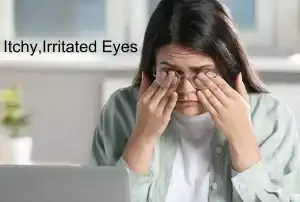
Here are some tips to help you best deal with the effects of smoke air pollution:
- Stay inside as much as possible. When going out, wear a good quality mask, ideally an N95 mask. If you don’t have an N95 mask, a surgical mask, cloth mask, or scarf is better than nothing, to help keep smoke from getting into your throat, nose, and lungs.
- When in your car, use the setting that recirculates the air, which prevents outside air from entering the cabin of your car.
- Stay hydrated. Drink plenty of water and warm liquids: herbal tea, body temperature lemon water, and broths. Chrysanthemum tea is an especially good choice, as it is calming, and good for soothing eye irritation.
- Irrigate your nasal passages with saline solution, which can help relieve allergic rhinitis.
- Use an air purifier with a HEPA filter in your home to filter particulate matter out of the air. Keeping house plants also helps keep the air in your home clean.
It is natural to feel anxiety and emotional stress when bad things are happening all around you. It is essential that you take time to calm and center yourself, so that you can make good decisions and be there for your loved ones and neighbors.
Take time to meditate and care for yourself. Show your love and concern for those around you, and don’t hesitate to reach out and ask for help.
Avoid reliance on caffeine, alcohol, and sugar. These things can cause dehydration, inflammation, and overstimulation. Be sure you and family are drinking plenty of water and eating nourishing foods.
One of our favorite recipes that helps to clear mucus from the lungs is to puree steamed asian pears, mash, and eat as you would applesauce. This traditional home remedy for lung congestion is also helpful when someone has bronchitis or a stubborn chest cold.
Listen to soothing music. Don’t keep the news programs on all the time. Do what you need to do to have your essentials packed and ready, without overreacting.
Do your best to keep a positive mindset. Trust yourself to know what is best for you and your family. You have come through difficulties before, and you will do it again.
From all of us at Art of Wellness, we encourage you to stay strong and healthy through this crisis. We will be here to help you in every way we can.
*This article is for education from the perspective of Traditional Chinese Medicine only. The education provided by this article is not approved by FDA to diagnose, prevent, treat and cure human diseases. It should not stop you from consulting with your physician for your medical conditions. Traditional Chinese Medicine is based on Qi, which is an invisible force that usually cannot be observed by modern science. Because science focuses on testing ideas about the natural world with evidence obtained through observation, these aspects of acupuncture can’t be studied by science. Therefore acupuncture and Chinese herbs are often not supported by double-blind, randomized trials, and they are considered alternative medicine therapies in the United States.
How to Treat Bronchitis With Acupuncture and TCM
By Xiaomei Cai, L.Ac., Ph.D. & Qineng Tan, L.Ac., Ph.D.

Chest cold with a productive cough, shortness of breath, coughing up mucus? These could be acute bronchitis symptoms. Acupuncture and TCM herbs can provide an alternative bronchitis treatment to help relieve chest congestion and a chronic cough.
Bronchitis is a respiratory infection in which the bronchial tubes, or airways, become inflamed. It typically causes chest congestion, a wet cough, coughing up phlegm, and difficulty breathing. Acute bronchitis usually develops due to the same kinds of viral infections that cause the common cold or pneumonia.
Chronic bronchitis refers to long-term inflammation of the lungs and bronchial tubes that is not related to an infection. If a person has a cough with mucus that lasts for months, or happens year after year, it is considered chronic bronchitis. This can happen as a result of smoking, and/or exposure to air pollution.
Like emphysema, chronic bronchitis is considered a chronic obstructive pulmonary disease (COPD). There are other lung conditions that can cause symptoms similar to those of bronchitis, including: asthma, sinusitis, whooping cough (pertussis) and tuberculosis.
Acute bronchitis usually clears up within a few weeks, but the persistent cough may linger. Antibiotics do not help treat viral infections, so the treatment for bronchitis is usually just to help suppress the cough and reduce aches and pains.
TCM treatment with acupuncture and herbs can help relieve bronchitis symptoms without side effects. It can also help remove pathogens and blockages affecting the lungs, so that bronchitis doesn’t turn into a chronic, recurrent condition.
Bronchitis Symptoms
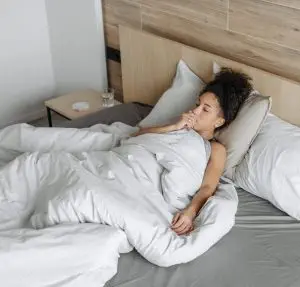
Acute bronchitis causes the airways of the lungs—the bronchial tubes—to swell, and the lungs to produce extra mucus. Coughing, with clear or yellowish phlegm, is the primary symptom of bronchitis.
The most commons symptoms of bronchitis include:
- Cough, phlegmy cough, cough with mucus, productive cough, persistent cough
- Chest soreness, tightness in chest, chest pain
- Fatigue, feeling tired
- Shortness of breath, trouble breathing, wheezing
- Sore throat
- Stuffy nose, runny nose
- Body ache, headache, back pain, muscle pain
- Low grade fever
Is bronchitis contagious? It is not so much bronchitis as a condition—that is, inflammation and congestion in the lungs—is contagious, as the virus or bacterial infection that caused bronchitis to develop is contagious for a period of time. The coughing may last for a while beyond the infectious period. Sleeping can be difficult, because the cough tends to worsen when a person lies down.
Bronchitis Treatment
When you seek treatment for acute bronchitis from a physician, it is generally treated in the same way as the common cold. Recommendations will include:
- Rest
- Increase fluid intake, drink more water
- Take OTC pain relievers
- Take expectorants or cough suppressants to manage coughing
- Use a humidifier or sit in a steamy shower room to help relieve congestion
These remedies may help to temporarily relieve symptoms while a person gets over the infection. However, some of these medications can cause side effects, and they do not do much to help prevent bronchitis from coming back the next time a virus is going around.
Chronic bronchitis, as a COPD, is considered a chronic illness that must be managed, so as to slow its progression. Quitting smoking is the first recommendation. Then, bronchodilators, steroids, and/or antibiotics may be prescribed to help open the airways, reduce inflammation, and prevent recurrent infections.
These medical interventions, too, can come with significant side effects. Corticosteroids, in particular, if taken over a long period of time, can cause liver damage.
Making a major lifestyle change, like getting rid of a nicotine addiction, is easier said than done.
Fortunately, acupuncture and TCM herbs offer a complementary medicine to help relieve bronchitis symptoms, treat the deeper root causes, and also help with quitting smoking, if necessary.
Can Acupuncture Help Bronchitis?

According to TCM theory, bronchitis is the result of pathogenic forces like Wind and Dampness affecting the lungs and other organs systems that are interrelated. An acupuncturist looks for the particular patterns of symptoms in each individual, and tailors acupuncture treatment and herbal supplements, according to which organ system patterns are involved. These may include:
- Lung dampness
- Lung deficiency
- Lung dryness
- Phlegm-heat obstructing lung
- Wind invasion
- Spleen Qi deficiency
- Spleen/Kidney Yang deficiency
- Qi and/or Yin deficiency
Multiple studies have shown that acupuncture treatment and herbal cough preparations can be even more effective than conventional medicines when helping to relieve post-infectious chronic coughing.
Studies have shown that acupuncture can help reduce bronchial inflammation and damage, relieve coughing and reduce phlegm production. It can also help boost immune function.
One study detailed how patients with chronic bronchitis, who had been taking steroids for years, were able to reduce or entirely stop their use of steroids after receiving acupuncture treatments for a few months.
Chinese herbs, used in combination, can help relieve bronchitis symptoms and work on other levels, too. They can help clear toxins from the tissues and promote regeneration of new, healthy tissue, and improve immunity, so that the next time a virus is going around, the body is better equipped to fight it off quickly.
Top 5 Tips for Getting Rid of Bronchitis Naturally
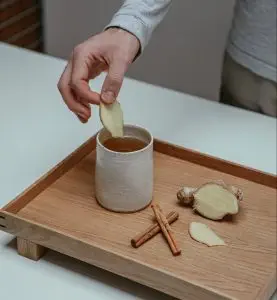
Getting acupuncture treatment and specific herbs for your condition will be helpful. In addition, you can help strengthen your lung health by practicing these habits:
- Avoid dairy products, which increase mucus production
- Drink warm herbal teas, fresh ginger tea, and lemon water to help stay hydrated and thin phlegm. Avoid caffeine and alcohol, which dehydrate you. Ginger helps reduce inflammation.
- Steam an asian pear until very soft, and eat like applesauce. This helps clear mucus.
- Breathing exercises can be helpful; ask your acupuncture practitioner to show you some good breathing techniques.
- Take Yin Qiao pills at the very first sign of a cough or sore throat. This is a traditional Chinese formulation that helps ward off colds and coughs if taken early.
Acupuncture Near Me for Bronchitis in West Los Angeles
When a respiratory infection turns into a nagging cough, or worse, into chronic bronchitis that keeps coming back, year after year, it is important to seek treatment. With acupuncture and TCM herbs, it is possible to recover from a bronchial infection more quickly and comfortably. With regular acupuncture “tune-ups,” you can end the cycle of a chronic cough.
*This article is for education from the perspective of Traditional Chinese Medicine only. The education provided by this article is not approved by FDA to diagnose, prevent, treat and cure human diseases. It should not stop you from consulting with your physician for your medical conditions. Traditional Chinese Medicine is based on Qi, which is an invisible force that usually cannot be observed by modern science. Because science focuses on testing ideas about the natural world with evidence obtained through observation, these aspects of acupuncture can’t be studied by science. Therefore acupuncture and Chinese herbs are often not supported by double-blind, randomized trials, and they are considered alternative medicine therapies in the United States.
How to Treat a Sore Throat With Acupuncture and TCM
By Qineng Tan, L.Ac., Ph.D. & Xiaomei Cai, L.Ac., Ph.D.
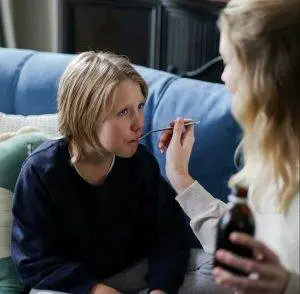
Scratchy throat? Dry throat? Painful Swallowing? A sore throat is often the first sign of a cold, but it can be hard to tell if a swollen throat is caused by a throat infection, a virus, bacterial infections like strep throat, allergies, or something else. Acupuncture and TCM Chinese herbs can provide excellent sore throat remedies to bring quick pain relief.
Throat pain, throat irritation, or trouble swallowing due to soreness is known as “pharyngitis.” The most common sore throat causes are viral infections, or cold and flu. This type of sore throat will usually go away once the infection runs its course.
The bacterial infection known commonly as “strep throat,” caused by streptococcus bacteria (throat strep), is another common cause of sore throat, usually accompanied by fever, swollen tonsils and lymph nodes, and red spots in the mouth.
But there are many possible causes of a sore throat, including:
- Common Cold – along with a runny nose, sneezing, and cough, a sore throat is one of the common cold symptoms.
- Flu – a sore throat with fever and chills or body aches may be a sign of flu.
- COVID-19 virus – many people are experiencing a sore throat as one of the early symptoms of the latest variant. This scratchy throat can last a long time.
- Mononucleosis – the Epstein Barr virus, also known as “mono,” can cause a sore throat, swollen lymph nodes, fatigue, and sometimes a skin rash.
- Chickenpox or measles – these illnesses often start off with a mild fever and sore throat; then, the rash or skin sores appear a few days later.
- Allergies – an allergy to pollen or other particles in the air may cause dryness in the throat. Postnasal drip can also create more irritation from constant throat-clearing.
- Dryness – when the weather is very dry—as it is here in California, sometimes—a stuffy nose during the night can lead to sleeping with your mouth open. Breathing dry air through your mouth can cause you to wake up with a sore, scratchy throat.
- Vocal strain – shouting and screaming at a concert, or overusing your voice with talking or singing can lead to throat pain and the need for vocal rest.
- GERD – Acid reflux can damage the tissues of the throat, causing difficulty swallowing, a hoarse-sounding voice, and chronic pharyngitis.
- Sleep Apnea – snoring can cause a dry mouth and sore throat.
Sore Throat Treatment
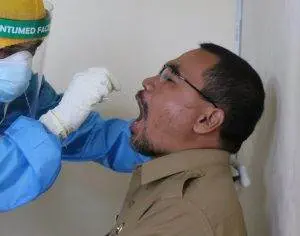
A doctor will typically perform a swab test or throat culture to check if a person has strep throat or a staph infection. If so, antibiotics are usually prescribed to treat the bacterial infection. But antibiotics will not help a sore throat that is due to a viral infection. Most people will take pain relievers or sore throat medicine to help relieve throat pain, or suck on throat lozenges.
People who suffer from burning chest pain and sore throat from GERD will often use over-the-counter antacid tablets to help with scratchy throat.
Most people just wait out a sore throat, hoping it will get better within a few days and not turn into chronic pharyngitis. Acupuncture and other TCM treatments can help reduce the time it takes to get over a sore throat and related illness.
Can Acupuncture Help a Sore Throat?

TCM methods have been used to treat upper respiratory infections, or the common cold, for thousands of years. According to TCM theory, “heat” is a pathogenic force that encompasses conditions of too much heat and dryness in the body. This excess heat can come from both external factors and internal factors. There may be a yin deficiency, meaning that there is not enough yin energy to cool down the body.
People are more prone to developing heat imbalances during the winter months because they tend to spend more time indoors with the heat on, eat more warm foods, and get less exercise. Too much heat builds up in the body, and this leads to inflammation, dryness, and sometimes itchy skin and rashes.
Acupuncture treatment can help reduce inflammation and provide analgesic pain relief of a sore throat. One study showed that people treated with auricular acupuncture for sore throat reported less pain, both 15 minutes after treatment, and six hours later. Acupuncture can also work to help clear heat from the organ systems of the body, clear phlegm from the lungs and upper respiratory tract, and to strengthen the Wei Qi, or defensive Qi.
Chinese herbs will also be instrumental in helping to clear up a sore throat. There are many varieties of herbal formulae that work in different synergistic ways to alleviate a sore throat, depending on the other related symptoms and whether or not there is some type of infection present. An acupuncture practitioner will be able to customize a formula for each individual patient, but there are many tried-and-true Chinese herb preparations that work well for colds and sore throats in many cases.
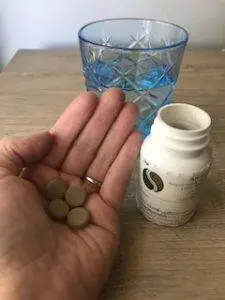
Yin-Qiao, an herbal formulation composed of several Chinese herbs, is a very popular remedy for the common cold and works very well to shorten the duration of a cold, especially if taken right at the first sign of a sore throat. Yin-Qiao has been shown to work on many levels, as an antiviral, anti-bacterial, and an anti-inflammatory, as well as helping to strengthen immunity.
A sore throat is a sign that you should rest your voice, get extra sleep, and consume plenty of liquids. We recommend sipping on warm water, on its own or with lemon or ginger, or an herbal tea such as mint. Eat more cooling foods, such as: apples, pears, especially Asian pears, radishes, cucumbers. These will help dispel heat.
Acupuncture for Sore Throat Near Me in West Los Angeles
While often a sore throat is simply a symptom of a mild cold, it is also a clear signal that there is some kind of infection or other imbalance present. It is wise to pay attention and do everything you can to boost your immune system as soon as you notice that scratchy throat sensation. An acupuncture treatment and herbs can go a long way towards helping make sure that a sore throat doesn’t turn into something more serious.
*This article is for education from the perspective of Traditional Chinese Medicine only. The education provided by this article is not approved by FDA to diagnose, prevent, treat and cure human diseases. It should not stop you from consulting with your physician for your medical conditions. Traditional Chinese Medicine is based on Qi, which is an invisible force that usually cannot be observed by modern science. Because science focuses on testing ideas about the natural world with evidence obtained through observation, these aspects of acupuncture can’t be studied by science. Therefore acupuncture and Chinese herbs are often not supported by double-blind, randomized trials, and they are considered alternative medicine therapies in the United States.
How to Detox With Acupuncture and TCM
By Xiaomei Cai, L.Ac., Ph.D. & Qineng Tan, L.Ac., Ph.D.
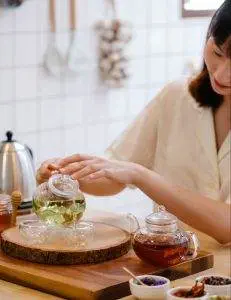
Why is it important to do a detox or body cleanse periodically? When done with the right support from an acupuncturist near me, detoxing can help improve your digestion, immune function, fertility, and many other aspects of your health. Store bought colon cleanse products or a juice cleanse won’t really do the job, though. A detox program with acupuncture and Chinese herbs will do more to optimize your health than just a detox diet will.
When we recommend our Detox Program at Art of Wellness, we are not talking about fasting or detox drinks, like a master cleanse. The goal of our program is to detoxify the organ systems of the body: it’s a liver detox, kidney cleanse, lungs, heart, and spleen. This is a full body cleanse designed to give you a health reset. According to TCM philosophy, your body knows how to repair and renew itself, but it cannot do this job when it is congested and out of balance.
In TCM, we have a broad concept of what “toxins” are and how they can affect our bodies and our health. Toxic chemicals that come from our environment, such as food additives, pesticides, cleaning products, and beauty and hygiene products are certainly part of the problem. Drugs, medicines, alcohol, and unhealthy foods can also be toxic. So can behavioral habits, like sitting and looking at our screens and devices too long.
But our own bodies produce toxins, too. The waste products our organs create are “toxic,” and if they are held in the body too long without being adequately cleared out, they can negatively impact organ function. Imbalances in the system can cause conditions of excess heat or phlegm, which can lead to all kinds of problems with both your physical and mental health.
Stress, lack of sleep, and extreme emotions can also contribute to toxic conditions in the body and mind. When the organ systems are out of balance, the body is under constant pressure to keep functioning, but we do not feel our best.
Signs you need to detox include:
- Fatigue, low energy, tired all the time
- Foggy head, memory problems, trouble concentrating
- Constipation
- Trouble sleeping, insomnia
- Weight gain
- Hair loss
- Hormone imbalances
- Signs of rapid aging
- Skin rash, acne
- Fingernails are brittle, lined or ridged
- Severe PMS symptoms or menopause symptoms
- Headaches, migraine
- Water retention, edema, swelling in extremities
Inflammation is largely created by toxic conditions in the body, and most pain conditions and chronic illnesses stem, at least in part, from inflammation somewhere.
Why You Need a Liver Detox
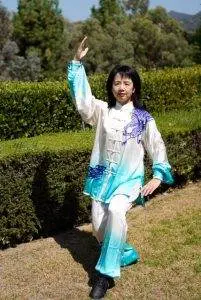
In conventional medicine, we think of the liver as being a sort of filter that removes toxins from the blood and helps metabolize fat. In TCM theory, we consider the liver to be the storehouse and distributor of blood; therefore, it also plays a crucial role in the menstrual cycle. The liver is also strongly connected to a person’s emotional life.
Stress, lack of sleep, too much sugar, alcohol, fatty, fried foods, pharmaceutical medicines, and recreational drugs all tax the liver above and beyond what it needs to do just to keep the blood flowing to nourish the body. When too many demands are placed on the liver, it can cause all kinds of symptoms, including: fatigue, insomnia, and headaches. Feelings of anger, frustration, anxiety, and irritability may arise. Conversely, when a person is feeling bitter and resentful, and isn’t able to express it, those unresolved emotions may begin to cause trouble with liver function.
Just as the liver governs the blood, in TCM, the kidneys govern the water of the body, controlling elimination through the bladder, and maintaining blood pressure by keeping the right amount of water in the bloodstream. Signs that the kidneys are not balanced include: problems with blood pressure, edema, puffiness in the face or extremities, UTIs, chronic fatigue, and menopause symptoms, like dryness and hot flashes.
Detoxing the organ systems, including the liver and kidneys especially, can help rejuvenate the digestion and allow better nutrition to reach all parts of the body, as the quality and flow of blood and other bodily fluids will be improved.
Making sure that your excretory system is in good working order before starting a cleanse is important. If you are already having problems with constipation, for example, we will want to make sure we get things moving before we start cleansing the organs. Our detox also focuses on the body’s largest excretory organ: the skin.
Top 10 Reasons To Detox

It is a good idea for everyone to detox periodically; detoxing every six months is reasonable for most people. Sometimes we will specifically recommend a detox for a patient when they are struggling with a particular health problem, or if they are planning a pregnancy.
Detoxing can help:
- Boost Immunity – a cleanse will help get your lymphatic system, which produces and transports immune cells and removes waste from cells, moving, improving the efficacy of your immune system.
- Break Free From Addiction – if you are ready, a commitment to the detox program and food plan can help you end patterns of substance abuse, drug use, alcohol addiction, smoking, and other types of dependency.
- Infertility – We often advise people who come to Art of Wellness for fertility treatment to begin with the Detox Program. Not only will this help increase the chances of conception occurring, whether naturally or with the aid of ART, but it will also lay the foundation for your child’s health in the future.
- Improve sleep – This works both ways. In order for the body to do its routine daily work of removing toxic waste, it needs plenty of sleep. The Liver, in particular, is working hard through the night to clean and deliver fresh blood to the cells. Sleeping on your side enhances your body’s ability to do this work, allowing the internal organs to drain properly. When your body is functioning well, your sleep will be of better quality, more restful and refreshing.
- Improve skin and hair – Dull eyes and skin, dark circles or bags, puffiness, and thinning hair are signs of stagnant blood and Qi. Nutrients from the right foods and Chinese herbs help to nourish the skin, and clear heat, dampness, and dryness. When old cells are removed, hair and eyes can shine again. Acupuncture treatment can help stimulate collagen production, which also happens while you sleep.
- Weight loss – While our acupuncture detox is not about how to lose belly fat fast, many people will find that it gives them a good foundation for new eating habits. Detoxing the liver and kidneys will help your body metabolize fat better.
- Balance hormones – severe PMS symptoms, bloated stomach and mood swings, perimenopause symptoms, infertility in women and infertility in men (oligospermia) can all be improved when hormone function improves. Acupuncture treatment can also help relieve conditions like PCOS, fibroids/leiomyoma, and endometriosis for women, and BPH in men.
- Reduce inflammation – many illnesses and pain conditions are inflammatory in nature. If you are suffering from pain due to plantar fasciitis, gout, rheumatoid arthritis, tennis elbow, carpal tunnel syndrome, shoulder or hip pain, acupuncture can help.
- Increased energy – better nutrition, better circulation, better sleep, and better organ function will all work synergistically to help you feel more energetic.
- Chronic illness – many chronic illnesses are rooted in toxic conditions within the body or exposure to toxins. Hard-to-treat conditions like autoimmune conditions and other systemic problems may be helped with alternative medicine when conventional medical treatments have not been successful. We treat many conditions with acupuncture and herbs, such as: lupus, lyme disease, celiac disease, fibromyalgia, and Crohn’s disease. We also provide support for people going through cancer treatment.
7 Steps of Detox Program With TCM Acupuncture and Herbs
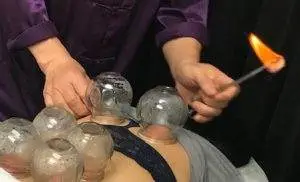
Pain and dysfunction occur when there is imbalance and when there are areas of stagnation within the body. Think of the metaphor of a house that needs to be deep-cleaned; there are dark corners of the body that have been ignored for a while, where dust and cobwebs have gathered. The Detox program reaches into these pockets of stagnation, sweeps them clean, and makes sure they get some fresh air and sunlight shining on them, in the form of invigorated Qi and blood.
- Acupuncture Treatments – the primary goal of acupuncture treatments during the detox phase is to get Qi moving freely, remove blockages, and to assist in elimination of toxins from the body.
- Cupping Treatment – the TCM modality of cupping creates a vacuum-like suction that moves Qi and blood from the innermost parts of the body outwards. During the detox program, cupping helps to pull toxins out of the lungs and other organs.
- Detox Herbs – the Chinese herb detox tea helps to clear heat and toxins from the body and improve digestion and elimination.
- Foot Pad Detox – detox foot patches, worn as you sleep at night and removed in the morning, help to pull toxins and fatty deposits from the body.
- Detox Bath – Sweating is an excellent way to remove toxins through the skin; this is why so many traditions rely on saunas and hot baths. Our herbal sachets allow you to enjoy a therapeutic herbal soak in your own bathtub.
- Exercise – Your acupuncturist will instruct you on how to practice daily exercises, based on QiGong movements, that will help to get Qi and blood moving.
- Nutrition – the food plan during the detox is based on whole grains, lean proteins, and plenty of vegetables, flooding your system with nutrients.
Detox Near Me Los Angeles, Westside
The beginning of the year, springtime, after recovery from a long illness, while preparing for a healthy pregnancy–anytime may be the right time for you to detoxify your system and get a fresh start. We recommend that you take the time to dedicate yourself to a week of cleansing with the Art of Wellness Detox Program at least twice a year for optimal health benefits.
*This article is for education from the perspective of Traditional Chinese Medicine only. The education provided by this article is not approved by FDA to diagnose, prevent, treat and cure human diseases. It should not stop you from consulting with your physician for your medical conditions. Traditional Chinese Medicine is based on Qi, which is an invisible force that usually cannot be observed by modern science. Because science focuses on testing ideas about the natural world with evidence obtained through observation, these aspects of acupuncture can’t be studied by science. Therefore acupuncture and Chinese herbs are often not supported by double-blind, randomized trials, and they are considered alternative medicine therapies in the United States.
How to Treat BPH With Acupuncture and TCM
By Qineng Tan, L.Ac., Ph.D. & Xiaomei Cai, L.Ac., Ph.D.

Men, are you getting up to pee in the night? Having trouble beginning urinating when you have to go, or the flow of urine starts and stops? These may be signs of BPH (benign prostatic hyperplasia), also known as an enlarged prostate. Many men begin to have prostate problems as they get older, including UTIs, prostate infections, and inflammation of the prostate gland. Acupuncture and TCM can help relieve prostatitis symptoms and urinary symptoms of BPH.
BPH is a very common men’s health concern. About half of all men over 60 feel some symptoms of BPH, and by the time men are in their 80s, the vast majority of men will have an enlarged prostate. Prostate enlargement or prostate infections are not necessarily signs of prostate cancer symptoms, but they can cause trouble peeing. Urinary problems due to BPH can be painful and frustrating.
In a man’s body, the prostate gland is located right below the bladder. The urethra, the tube through which both urine and semen flow out of the body through the penis, passes through the prostate. This means there is a small area of the prostate that surrounds the urethra. As the prostate grows naturally over time, or becomes inflamed due to infection or injury, this area of the prostate can press on the urethra and bladder, affecting the process of urination.
The prostate gland is a reproductive organ that produces seminal fluid, which, when combined with sperm from the testes and other fluid from the seminal vesicles, produces semen: the cloudy white fluid that comes out of the urethra through the penis when a man ejaculates. The prostate contains smooth muscle tissue that squeezes the fluid out, and small ducts that block the urethra when ejaculation happens, so that urine doesn’t come out with the semen. Seminal fluid provides nutrients and energy for the sperm, and it also interacts with the chemistry in a woman’s reproductive organs, so prostate health is really important for men’s fertility.
The prostate gland is different from most organs in that it continues to grow throughout a person’s lifetime. This enlargement of the prostate is not entirely understood by medical science, but it is believed to be due to some mechanism of men’s hormone functioning. BPH is called “benign,” because it has nothing to do with the cause of prostate cancer and does not even mean you are at higher risk for prostate cancer.
According to conventional medicine, BPH is a normal part of aging. According to TCM theory, an enlarged prostate is more likely to cause problems when Qi is weak and specific organ systems are subject to too much damp heat. Acupuncture and herbs for BPH can help to restore healthy urinary function and reduce pain and inflammation in the prostate area.
What Is BPH?
The prostate gland goes through two periods of growth: during puberty, when it doubles in size, and then from age 25 until old age. Prostate growth varies from individual to individual, but overall, the prostate grows larger at a rate of 1.5 – 2.0% per year. As the prostate is getting bigger, it can start to press on the urinary tract organs. As men get older, they may begin to feel changes that make it more difficult to pass urine.
Top 5 Signs of BPH include:
-

Frequent trips to the bathroom may be a sign of BPH or prostatitis. Trouble starting to urinate, having to strain to start peeing, hesitancy
- Feeling like you can’t completely empty your bladder, like you still need to pee
- Feeling like you need to pee more often, reduced bladder capacity
- Weak stream of urine, “start and stop” peeing, dribbling pee
- Having to get up to pee at night, nocturia
Having urine left in the bladder even after you went to the bathroom can cause bacteria to build up and lead to prostate infections, UTIs, and chronic urinary symptoms that come and go over months. Prostatitis can mean a variety of men’s health issues that cause urinary symptoms and pain that are similar to symptoms of BPH.
Prostatitis Symptoms
The term prostatitis covers a few different kinds of men’s health issues that cause swelling and pain in the male reproductive organs, including bacterial bladder infections, UTIs, bladder stones, prostate stones, or after having some sort of procedure (like a surgery, biopsy, or catheterization). It also includes CPPS, chronic pelvic pain syndrome, where there is pain in the genitals without any apparent cause.
Prostatitis symptoms include:
- Pain in the penis, testicles, or the area behind the testicles, the perineum
- Painful urination, hurts to pee, dysuria
- Urgency, frequency, feels like you have to pee all the time
- Urine flow starts and stops, weak stream of urine
- Painful ejaculation, burning ejaculation, hurts to pee after sex
- Blood in semen
- ED, erectile dysfunction
Prostate infections and related infections can be either acute (serious in the short term) or chronic (lasting a long time and difficult to get rid of). An acute bacterial infection of the prostate or urinary tract can cause painful urination, a frequent need to pee, feeling urgency to urinate, or having trouble urinating. If left untreated, this kind of infection can lead to fever, chills, and feeling seriously ill. Chronic bacterial infection of the prostate gland can cause someone to have recurrent infections and symptoms that come and go over a period of months.
Some men can have prostatitis without any symptoms; this is known as asymptomatic inflammatory prostatitis. Many men don’t realize they have this kind of inflammation in the prostate until they are trying to get their partner pregnant and go through male infertility testing. Chronic prostatitis can negatively affect sperm count and male fertility.
CPPS, pain in the prostate area or sexual organs, is thought to be related to autoimmune disorders, and/or stress. Obesity can also affect pain in prostate by adding extra pressure.
Medical Treatment for BPH and Prostatitis
When you go see your medical doctor about BPH, first they will likely do a rectal exam, which is how they can check the size of the prostate gland, and blood and urine tests to check for bladder infection, kidney infection, or prostate infection. They will also check PSA levels (prostate-specific antigen), which can indicate enlargement of the prostate. Normal PSA levels vary depending on age. If PSA levels go up significantly over a short period of time, it is considered a possible indication of prostate cancer risk, and your doctor may recommend further testing, like a biopsy.
Treatment for BPH can involve medications called alpha-blockers that relax the muscles of the bladder and prostate (Flomax). 5-alpha reductase inhibitors are drugs that affect the hormones and can cause the prostate to shrink. These medications can take a while to be effective, and for some patients, they are not particularly helpful.
There are also several types of surgery that are used to help BPH by removing parts of the prostate to help relieve pressure on the urethra, or by blocking blood flow to the prostate to prevent further growth. These surgeries are not indicated for all cases, though, and can have negative results for some men, including infections, bleeding, and ED.
Antibiotics are used to treat prostatitis and other UTIs related to enlarged prostate. These usually work well for acute infections, but not so well for chronic cases. Antibiotics are not effective for treating CPPS, which is by far the most common type of prostate problem.
Can Acupuncture Help BPH Enlarged Prostate?

TCM is a complete medical system that goes back thousands of years in China, with many written records of acupuncture points and herbal formulations used to treat all kinds of health problems. The TCM view of the organ systems of the body is a bit different from the way they are understood in western medicine. For example, TCM sees the reproductive organs as being related to the functioning of other organs, like the kidneys and liver.
The prostate is considered to be closely related to the kidney system, and if the Qi (life force energy) of the kidneys or liver is weak, excess dampness and heat can begin to build up in the lower region of the pelvic area.
TCM recognizes the strong connections between emotions and physical health. Feelings of anger and pent-up frustrations are associated with liver stagnation, while stress, anxiety, worrying, and overworking can impact the kidneys and spleen. Lifestyle habits like lack of sleep, lack of exercise, poor diet, using drugs, or overdoing sexual activities can also create conditions for men’s health issues like BPH to become problematic.
An acupuncturist will look at each individual’s situation to determine which organs are involved, and will use acupuncture points for prostate pain and Chinese herbs for prostate inflammation to help restore balance to men’s hormones and energy.
Acupuncture to treat BPH and acupuncture points for prostatitis can help to relieve difficult urination, and pain in the prostate area, without down time or negative side effects.
A clinical trial of 100 patients treated with acupuncture for BPH over the course of 6 weeks showed that over 90% of the men responded positively, reporting less pain in the prostate and improved urinary functioning.
A systematic review of eight studies involving over 650 men treated for BPH with TCM showed significant positive changes in men’s health outcomes.
A review of studies using Chinese herbs for BPH suggested that herbal treatment for BPH may work even better than alpha-blockers.
Acupuncture Near Me for BPH in Santa Monica, California
Most men will deal with BPH as they go through the aging process, but there are steps you can take to minimize prostate problems. If you are feeling pain in the prostate, urgency to urinate, peeing more frequently, or like you can’t empty your bladder completely, it might be worth it to try acupuncture and herbs to help prostate enlargement. Unlike medical treatments for BPH, there really is no downside to trying acupuncture for men’s health issues. Dr. Tan and Dr. Cai at Art of Wellness in West Los Angeles have over 30 years of experience helping men improve their fertility and sexual health.
*This article is for education from the perspective of Traditional Chinese Medicine only. The education provided by this article is not approved by FDA to diagnose, prevent, treat and cure human diseases. It should not stop you from consulting with your physician for your medical conditions. Traditional Chinese Medicine is based on Qi, which is an invisible force that usually cannot be observed by modern science. Because science focuses on testing ideas about the natural world with evidence obtained through observation, these aspects of acupuncture can’t be studied by science. Therefore acupuncture and Chinese herbs are often not supported by double-blind, randomized trials, and they are considered alternative medicine therapies in the United States.
